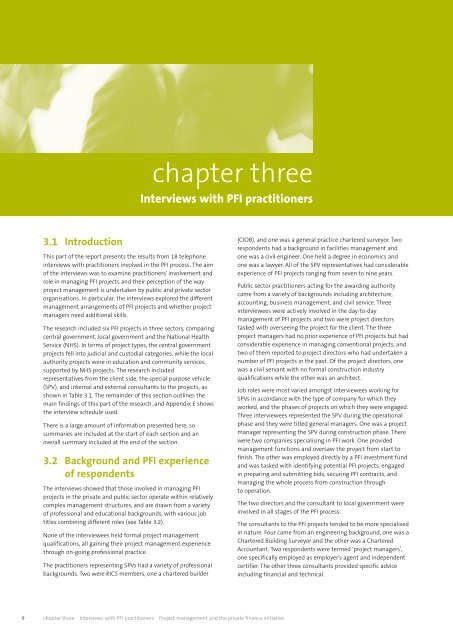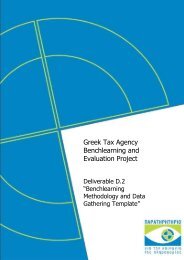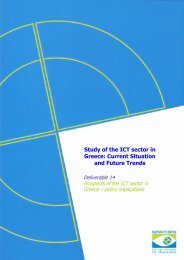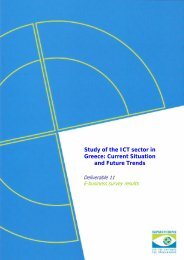Project management and the private finance initiative
Project management and the private finance initiative
Project management and the private finance initiative
You also want an ePaper? Increase the reach of your titles
YUMPU automatically turns print PDFs into web optimized ePapers that Google loves.
3.1 Introduction<br />
This part of <strong>the</strong> report presents <strong>the</strong> results from 18 telephone<br />
interviews with practitioners involved in <strong>the</strong> PFI process. The aim<br />
of <strong>the</strong> interviews was to examine practitioners’ involvement <strong>and</strong><br />
role in managing PFI projects <strong>and</strong> <strong>the</strong>ir perception of <strong>the</strong> way<br />
project <strong>management</strong> is undertaken by public <strong>and</strong> <strong>private</strong> sector<br />
organisations. In particular, <strong>the</strong> interviews explored <strong>the</strong> different<br />
<strong>management</strong> arrangements of PFI projects <strong>and</strong> whe<strong>the</strong>r project<br />
managers need additional skills.<br />
The research included six PFI projects in three sectors, comparing<br />
central government, local government <strong>and</strong> <strong>the</strong> National Health<br />
Service (NHS). In terms of project types, <strong>the</strong> central government<br />
projects fell into judicial <strong>and</strong> custodial categories, while <strong>the</strong> local<br />
authority projects were in education <strong>and</strong> community services,<br />
supported by NHS projects. The research included<br />
representatives from <strong>the</strong> client side, <strong>the</strong> special purpose vehicle<br />
(SPV), <strong>and</strong> internal <strong>and</strong> external consultants to <strong>the</strong> projects, as<br />
shown in Table 3.1. The remainder of this section outlines <strong>the</strong><br />
main findings of this part of <strong>the</strong> research, <strong>and</strong> Appendix E shows<br />
<strong>the</strong> interview schedule used.<br />
There is a large amount of information presented here, so<br />
summaries are included at <strong>the</strong> start of each section <strong>and</strong> an<br />
overall summary included at <strong>the</strong> end of <strong>the</strong> section.<br />
3.2 Background <strong>and</strong> PFI experience<br />
of respondents<br />
The interviews showed that those involved in managing PFI<br />
projects in <strong>the</strong> <strong>private</strong> <strong>and</strong> public sector operate within relatively<br />
complex <strong>management</strong> structures, <strong>and</strong> are drawn from a variety<br />
of professional <strong>and</strong> educational backgrounds, with various job<br />
titles combining different roles (see Table 3.2).<br />
None of <strong>the</strong> interviewees held formal project <strong>management</strong><br />
qualifications, all gaining <strong>the</strong>ir project <strong>management</strong> experience<br />
through on-going professional practice.<br />
The practitioners representing SPVs had a variety of professional<br />
backgrounds. Two were RICS members, one a chartered builder<br />
chapter three<br />
Interviews with PFI practitioners<br />
9 chapter three Interviews with PFI practitioners <strong>Project</strong> <strong>management</strong> <strong>and</strong> <strong>the</strong> <strong>private</strong> <strong>finance</strong> <strong>initiative</strong><br />
(CIOB), <strong>and</strong> one was a general practice chartered surveyor. Two<br />
respondents had a background in facilities <strong>management</strong> <strong>and</strong><br />
one was a civil engineer. One held a degree in economics <strong>and</strong><br />
one was a lawyer. All of <strong>the</strong> SPV representatives had considerable<br />
experience of PFI projects ranging from seven to nine years.<br />
Public sector practitioners acting for <strong>the</strong> awarding authority<br />
came from a variety of backgrounds including architecture,<br />
accounting, business <strong>management</strong>, <strong>and</strong> civil service. Three<br />
interviewees were actively involved in <strong>the</strong> day-to-day<br />
<strong>management</strong> of PFI projects <strong>and</strong> two were project directors<br />
tasked with overseeing <strong>the</strong> project for <strong>the</strong> client. The three<br />
project managers had no prior experience of PFI projects but had<br />
considerable experience in managing conventional projects, <strong>and</strong><br />
two of <strong>the</strong>m reported to project directors who had undertaken a<br />
number of PFI projects in <strong>the</strong> past. Of <strong>the</strong> project directors, one<br />
was a civil servant with no formal construction industry<br />
qualifications while <strong>the</strong> o<strong>the</strong>r was an architect.<br />
Job roles were most varied amongst interviewees working for<br />
SPVs in accordance with <strong>the</strong> type of company for which <strong>the</strong>y<br />
worked, <strong>and</strong> <strong>the</strong> phases of projects on which <strong>the</strong>y were engaged.<br />
Three interviewees represented <strong>the</strong> SPV during <strong>the</strong> operational<br />
phase <strong>and</strong> <strong>the</strong>y were titled general managers. One was a project<br />
manager representing <strong>the</strong> SPV during construction phase. There<br />
were two companies specialising in PFI work. One provided<br />
<strong>management</strong> functions <strong>and</strong> oversaw <strong>the</strong> project from start to<br />
finish. The o<strong>the</strong>r was employed directly by a PFI investment fund<br />
<strong>and</strong> was tasked with identifying potential PFI projects, engaged<br />
in preparing <strong>and</strong> submitting bids, securing PFI contracts, <strong>and</strong><br />
managing <strong>the</strong> whole process from construction through<br />
to operation.<br />
The two directors <strong>and</strong> <strong>the</strong> consultant to local government were<br />
involved in all stages of <strong>the</strong> PFI process.<br />
The consultants to <strong>the</strong> PFI projects tended to be more specialised<br />
in nature. Four came from an engineering background, one was a<br />
Chartered Building Surveyor <strong>and</strong> <strong>the</strong> o<strong>the</strong>r was a Chartered<br />
Accountant. Two respondents were termed ‘project managers’,<br />
one specifically employed as employer’s agent <strong>and</strong> independent<br />
certifier. The o<strong>the</strong>r three consultants provided specific advice<br />
including financial <strong>and</strong> technical.

















